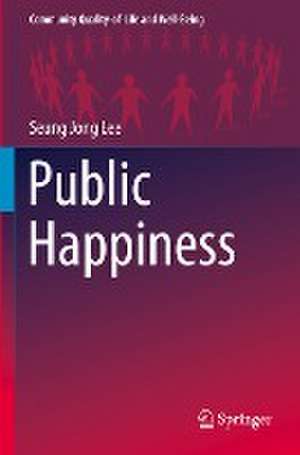Public Happiness: Community Quality-of-Life and Well-Being
Autor Seung Jong Leeen Limba Engleză Paperback – 20 noi 2022
| Toate formatele și edițiile | Preț | Express |
|---|---|---|
| Paperback (1) | 1091.35 lei 6-8 săpt. | |
| Springer International Publishing – 20 noi 2022 | 1091.35 lei 6-8 săpt. | |
| Hardback (1) | 1098.27 lei 6-8 săpt. | |
| Springer International Publishing – 19 noi 2021 | 1098.27 lei 6-8 săpt. |
Preț: 1091.35 lei
Preț vechi: 1148.78 lei
-5% Nou
Puncte Express: 1637
Preț estimativ în valută:
208.84€ • 219.04$ • 173.85£
208.84€ • 219.04$ • 173.85£
Carte tipărită la comandă
Livrare economică 01-15 aprilie
Preluare comenzi: 021 569.72.76
Specificații
ISBN-13: 9783030896454
ISBN-10: 3030896455
Pagini: 225
Ilustrații: XIII, 225 p. 16 illus., 5 illus. in color.
Dimensiuni: 155 x 235 mm
Greutate: 0.35 kg
Ediția:1st ed. 2022
Editura: Springer International Publishing
Colecția Springer
Seria Community Quality-of-Life and Well-Being
Locul publicării:Cham, Switzerland
ISBN-10: 3030896455
Pagini: 225
Ilustrații: XIII, 225 p. 16 illus., 5 illus. in color.
Dimensiuni: 155 x 235 mm
Greutate: 0.35 kg
Ediția:1st ed. 2022
Editura: Springer International Publishing
Colecția Springer
Seria Community Quality-of-Life and Well-Being
Locul publicării:Cham, Switzerland
Cuprins
Chapter 1. Paradigm of progress.- Chapter 2. Nature of public happiness.- Chapter 3. Efforts of international community.- Chapter 4. Trends in happiness research.- Chapter 5. Happiness-driven public policy.- Chapter 6. New paradigm for happiness-driven governance.- Chapter 7. National happiness policy around the world: overview.- Chapter 8. Case: Government 3.0 of Korea.- Chapter 9. Conclusion.
Notă biografică
Seung Jong Lee is Professor Emeritus of the Graduate School of Public Administration at Seoul National University. He received his B.A. and M.P.A. from Seoul National University and Ph.D. from Northwestern University. His research interests include local governance, citizen participation and community well-being. He is Author of several books such as Theories of Local Autonomy: Politics and Policy (2003), Theories of Civic Participation (co-author, 2011), National Happiness and Government 3.0 (co-author, 2013), Theories of Local Autonomy Institutions (co-author, 2015), Quality of Life of 21st Century Local Residents (co-author, 1998) and Unfolding Korean Civil Society and Community Citizenship (co-author, 1997). He is also Co-editor of Community Well-Being and Community Development (with Rhonda Phillips, Springer, 2014), Issues of Local Autonomy (2014), and Government and Participation in Japanese and Korean Civil Society (with Yoshiaki Kobayashi, 2010). He has also published many articles in the field of local governance, civic participation and community well-being.
He served as President of the Korea Association for Public Administration and as Editor-in-Chiefs of several academic journals, including Korean Public Administration Review, Korean Policy Studies, Journal of Local Autonomy Studies and Journal of Local Administration. He leads the Community Well-being Institute—a research group founded under the Social Science Korea (SSK) initiative funded by the National Research Foundation of Korea. Recently, he is endowed a leading scholars grant from the National Research Foundation of Korea for the research “Governance Innovation in the ‘Beyond GDP’ Era”. He has actively participated in various governmental advisory positions, such as President of the Korea Research Institute for Local Administration (KRILA), Member of the Presidential Transition Committee for the Park regime, Chairperson of the National Evaluation Committee for Local Performance, Chairperson of the Evaluation Committee of the Regional Board of Education and Vice Chair of the Presidential Committee on Local Autonomy Development.
He served as President of the Korea Association for Public Administration and as Editor-in-Chiefs of several academic journals, including Korean Public Administration Review, Korean Policy Studies, Journal of Local Autonomy Studies and Journal of Local Administration. He leads the Community Well-being Institute—a research group founded under the Social Science Korea (SSK) initiative funded by the National Research Foundation of Korea. Recently, he is endowed a leading scholars grant from the National Research Foundation of Korea for the research “Governance Innovation in the ‘Beyond GDP’ Era”. He has actively participated in various governmental advisory positions, such as President of the Korea Research Institute for Local Administration (KRILA), Member of the Presidential Transition Committee for the Park regime, Chairperson of the National Evaluation Committee for Local Performance, Chairperson of the Evaluation Committee of the Regional Board of Education and Vice Chair of the Presidential Committee on Local Autonomy Development.
Textul de pe ultima copertă
We all strive for personal happiness in one way or another, but what about public happiness? What does public happiness mean and what role can governments and public policies play? The current COVID-19 pandemic has highlighted the inadequacies of old governance paradigms and even before this pandemic, increasing inequalities and frustration with the old GDP-centric growth paradigm have fueled dissatisfaction with and distrust of governments. This book suggests a new path towards public happiness as a potential solution. The book builds a theory of public happiness as a distinct concept from individual happiness, borrowing especially from Eastern philosophy. It provides an overview of the efforts so far to go “beyond GDP” – including measurement and exploration of the determinants of happiness – and how these efforts have fallen short of expectation. Lastly, the book sketches out what a public happiness policy might look like and identifies the factors of a successful happiness policy.
Caracteristici
Discusses public happiness over individual happiness Examines policy orientations and governance innovation in order to increase public happiness Introduces the beyond-GDP movement











